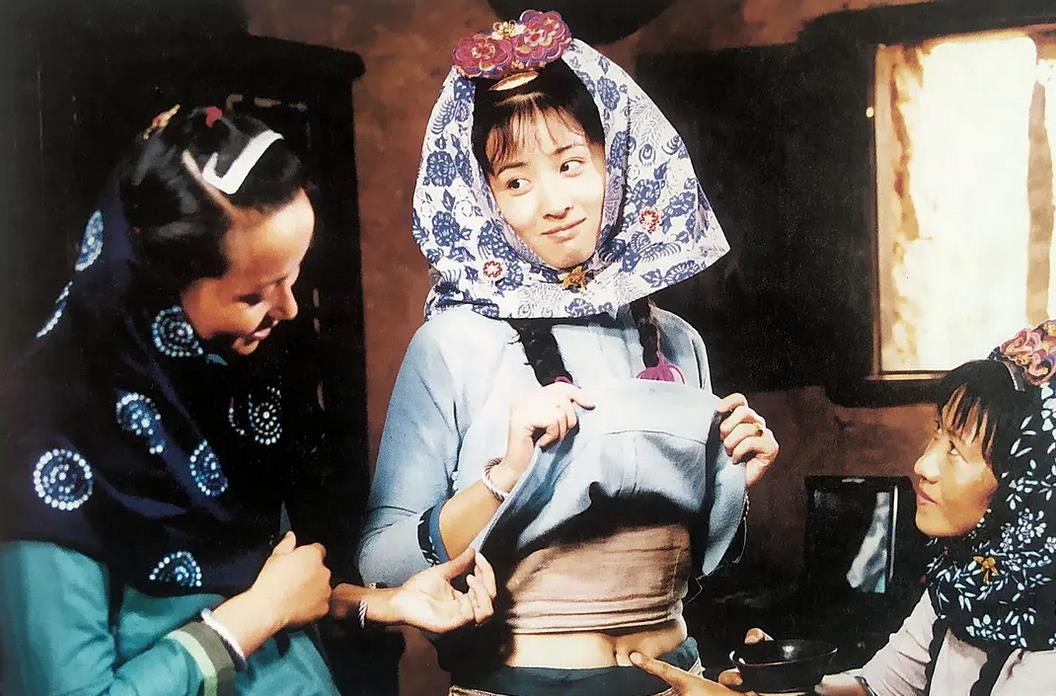Is the minor grading coming? it is too early
Text | Liu Nandou
Editor | He Runxuan
On March 17th, # Minors Channel # boarded a hot search in Weibo.
The reason comes from the day before, the State Administration of Radio and Television issued a notice on publicly soliciting opinions on the People’s Republic of China (PRC) Radio and Television Law (Draft for Comment), and publicly solicited opinions from the society.
Among them, Article 23 mentioned that "integrated broadcasting institutions of radio and television programs should adopt measures such as designing special frequency channels for minors, special time slots for minors, special program areas for minors, and modes for minors."

Tuyuan Weibo @ People’s Daily
How to understand the concepts of "special frequency channel for minors" and "special time period for minors"? Does this release the signal that the juvenile film and television grading system is coming?
At present, the State Administration of Radio, Film and Television (SARFT) has not elaborated on the specific implementation methods. Many people in the industry have indicated that there is still a long way to go before the introduction of the real film and television grading system. However, from the audience level, the expectation of the film and television grading system has been aroused again.
Memorable film and television classification
The earliest and most perfect film and television classification system in the world should be the United States.
In the earliest days, the United States was also in the stage of film censorship. In 1930, the famous "Hayes Code" was issued in the United States, which stipulated in detail 12 kinds of prohibited film contents to avoid the phenomenon of pornography and violence in the early stage of film development. It was not until 1968 that the Motion Picture Association of America formally established the film classification system, and after years of development, it gradually formed the current five-level system. According to American polls, about 75% of American audiences think that the film rating system is "very useful" or "relatively useful" in helping them choose movies.
However, the TV rating system was much later than that of movies. It was not until 1996 that the formal TV rating system was introduced in the United States, and operability was an important constraint. Because TV has a lower viewing threshold than movies, even if TV programs are graded, how can they be implemented to ensure that minors do not watch them? In the early 1990s, the United States invented a V-chip, which has been required to be installed in TV sets since 2000. It can identify the rating information in TV program signals and directly filter out programs that are not suitable for minors after pressing the remote control, forming a function similar to "child lock".
After the United States, many western countries have successively established film and television classification systems, including countries such as Japan and South Korea in Asia, and Hong Kong and Taiwan in China, which have also generally adopted the film and television classification system.
In fact, the mainland has not explored the film and television classification system. In 1989, the Ministry of Radio, Film and Television issued the Notice on Implementing a Grading System for the Examination and Projection of Some Films, which clearly defined four types of films that are not suitable for children, and stipulated that the words "not suitable for children" should be printed at the beginning of the film when it is sent to the factory for translation, development and printing of imported copies or when it is sent to the standard copy for review to show the difference from adult films.
At that time, the film Widow’s Village produced by Zhujiang Film Studio became the first work labeled as "not suitable for children". It is reported that the audience walked into the cinema with curiosity and found that the film was actually nothing remarkable, so the media criticized it one after another, and "Widow’s Village" became the first example of domestic film grading as hype. The attempt of grading system also ended in failure.

Widows’ village
The official attempt failed, but the spontaneous attempt by the people did not stop. In 2014, Dr. Lu Yufei, a doctor of brain science in China Academy of Sciences, introduced the first folk children’s film and television grading system, which graded 10 popular cartoons and child-friendly TV programs in China at that time according to the age suitable for watching young children, whether there was violence, swearing and sex in the films. The results show that Pleasant Goat and Big Big Wolf is suitable for children aged 7 and above, while Bears are suitable for children aged 10 and above.
Although this set of grading standards from the private sector has no substantive force, in the imagination of the makers, "most of the film grading systems in the world are not made by the government. With the spread of our grading system, parents will know which film and television works are not suitable for children of any age. Film and television animation that does not meet the standard, without ratings, will not buy the market, which will affect film and television animation production companies and drive them to make film and television animation according to this standard. "
But as a result, we also saw that, except for a period of heated discussion, the film list did not go deep into the parents’ ideas, and it was not updated afterwards.
The appeal of practitioners has never diminished. In 2012, the famous director Xie Fei published "An Open Letter Calling for Film Censorship to be Replaced by Film Grading System" in Weibo, which emphasized that "the establishment of a film grading system with legal constraints, administrative supervision and industry autonomy and self-discipline is the need of reform and the development of the times." In 2015, the 13th Cross-Strait and Hong Kong Film Directors Symposium issued an appeal, and hundreds of directors, including Xie Fei, jointly shouted for the film classification system.

Xie Fei tuyuan network
What is the magic of the film and television grading system, which makes the audience and practitioners forget it?
The reason is that, compared with the film and television grading system, under the current film and television censorship system in China, the works allowed to be broadcast through censorship mean "Xian Yi, young and old". However, the pursuit of "Xian Yi for all ages" can easily lead to the result of "not suitable for all ages". When minors do not have mature judgment ability, slight pornography, violence and other pictures may also bring adverse effects; For adults with judgment ability, the "pure version" of forcibly stripping off adult elements sometimes makes film and television works dull, and for creators, the artistic expression space will be limited accordingly.
According to the statistics of the Motion Picture Association of America, only 7% of all films rated by the Motion Picture Association of America belong to G (popular level suitable for audiences of all ages) from the implementation of the American film rating system to the end of 2002. It can be seen that "Xian Yi for young and old" is somewhat idealistic.
On the other hand, if the film grading system can be constructed and implemented, people of different ages can see their own film and television works. Xie Fei once said at a seminar that "classification is not for freedom, but to protect audiences of different ages and build a healthy film market".
Why is it so difficult to implement?
The development experience of western countries can be used for reference, and there are also plans and suggestions of people with lofty ideals from the official to the private sector in China. So why hasn’t the film and television classification been effectively promoted until now?
From a realistic point of view, the promotion of film and television classification in China is still facing many difficult dilemmas.
The first is the problem of operability. Most western film and television grading systems were born in the era when the Internet was underdeveloped. It is much easier to classify movies and TV stations than online media. The identity of minors can be verified when purchasing tickets in the cinema, and parents can master the remote control when watching programs in front of the TV, but there is no such convenient entrance to check when minors surf the Internet. Just as online games have introduced the anti-addiction mechanism for minors, it is often seen in news reports that it is impossible to prevent by registering parents’ ID cards to escape punishment.
The introduction of American TV rating system was only after the invention of V chip, which shows that an intelligent technology supports the operability of the rating scheme. At present, on Youtube, movies marked NC-17 can’t prevent people under the age of 17 from watching when they spread on the Internet, and the rating can only provide viewing options.
Nowadays, the network platform has become one of the most important channels for people to contact film and television works. According to the Research Report on the Development of Network Audiovisual in China in 2020, as of June 2020, the number of network audiovisual users in China has reached 901 million, and the number of integrated video users has reached 724 million, which is more than half of the total population in China. Under such circumstances, if the film and television classification system can only be applied to TV stations and cinemas, it will have a very limited substantive role in protecting minors.
Secondly, for TV stations, the introduction of grading system will touch the interests of some people to some extent. According to an interview with TV practitioners by Entertainment Capital Theory, "Judging from the current measures of soliciting opinions, TV will definitely not move the golden file out to add special time slots for minors, which is likely to lose money." The children’s channel itself is public welfare and educational, and it does not make money.
The same is true for movies. For films that can pass the review, the implementation of grading means the narrowing of the audience and will inevitably have a negative impact on the box office. Especially in the context of China film market gradually exploring the increasing number of people watching movies in recent years, "watching movies with the whole family" is becoming more and more popular, and the emergence of rating system will be unfavorable for some films to gain this audience.

In addition, as mentioned above, the main body of film classification in most countries and regions is industry associations and non-governmental organizations, while the executive body of China’s current censorship system is the State Administration of Radio, Film and Television. At the same time, the emergence of grading system often means that it will gradually replace the censorship system. Therefore, the establishment of the grading system in China requires not only the changes of the subject of examination, but also a long transition from examination to grading. Does the current trade association have enough scale and professional ability to undertake the task of grading and evaluation on the premise of ensuring fairness and scientificity? There are still many foundations to be laid.
On the whole, no matter what the final result of this exposure draft is, poison eyes believe that the film and television classification system cannot be established in the mainland at least in a short time. If you are really worried about the influence of young people on film and television works, perhaps it is the most practical and effective way to start with parents’ accompanying viewing. Don’t let TV or mobile phone become the "second nanny" of children.

